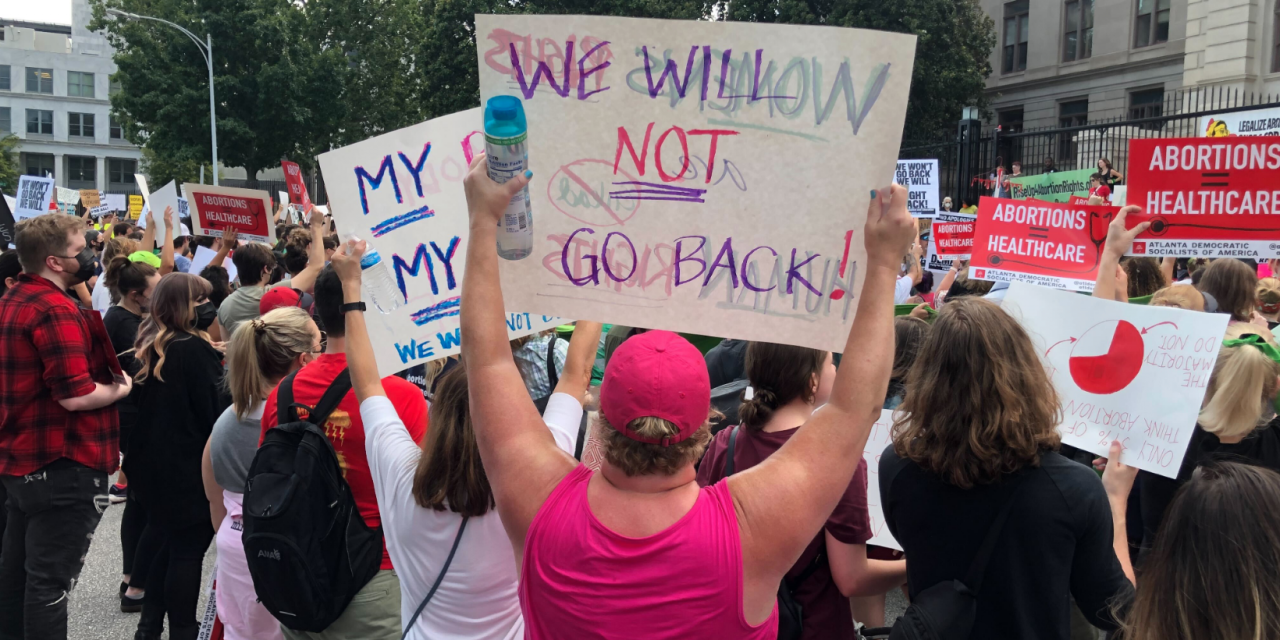The Georgia Supreme Court reinstated the state’s six week abortion ban on Nov. 23 after a lower court blocked the ban on Nov. 15. All in-state providers were required to immediately stop providing abortion services for patients with detectable fetal heartbeat activity after the reinstatement.
Emory College Republicans Chairman Robert Schmad (23C) supported the reinstatement, noting that he hopes Republicans will be “emboldened” to further restrict abortion access.
“The Georgia Supreme Court made the correct and obvious decision to throw out the brazenly political ruling from the lower court,” Schmad wrote in an email to the Wheel. “Georgia is well within its rights under Dobbs to restrict abortion access as it sees fit.”
Young Democrats of Emory Co-Communications Director Pranay Mamileti (26C) described the reinstatement as “disheartening” but “not surprising.”
“The state legislature, as well as the governor’s mansion are both controlled by anti-abortion republicans, so there was really no world in which the overturning of Georgia’s anti-abortion law lasted,” Mamileti wrote in an email to the Wheel.
Sara Redd, a postdoctoral fellow at Emory University’s Center for Reproductive Health Research in the Southeast (RISE), commented that the reinstatement is “reflective of the anti-abortion movement’s larger agenda.” She noted the recent lawsuit against the FDA from anti-abortion organizations to rescind the FDA-approval of mifepristone, an integral medication for pregnancy loss and miscarriage management.
“These legal actions are clearly geared towards making abortion as inaccessible as possible while disregarding the wishes of most Americans, as poll after poll indicates that the majority of Americans believe that abortion should be legal,” Redd wrote in an email to the Wheel.

A crowd of people covered the street in front of the Georgia State Capitol Building on June 24, protesting the Supreme Court’s decision to overturn Roe. Courtesy of Chloe Yang (22C).
Dabney Evans, associate professor of global health and affiliated faculty at RISE, also pointed out that the “overwhelming” majority of Americans would be against a reintroduction of the six-week ban, as evidenced both on the ballot and in polling.
The Supreme Court of Georgia’s ruling follows Fulton County Superior Court Judge Robert McBurney’s announcement on Nov. 15 that Georgia could no longer enforce Gov. Brian Kemp’s heartbeat bill and must resume allowing abortions up to 20 weeks of pregnancy. The heartbeat bill took effect in July and bans most abortions after six weeks.
Georgia’s Office of the Attorney General filed an appeal with the state Supreme Court on Nov. 18 requesting the court to reverse McBurney’s blocked enforcement of the heartbeat bill, citing concerns that clinics would begin performing abortions again.
McBurney deemed the heartbeat bill unconstitutional on the basis that it violated Roe v. Wade, which was still in effect when the bill was initially passed in 2019. He said his decision was based on the “uncontroversial” notion that legislatures violate separation of powers by passing laws contradicting court rulings.
“Everywhere in America, including Georgia, it was unequivocally unconstitutional for governments — federal, state or local — to ban abortions before viability,” McBurney wrote in his ruling. He added that when “legislatures exceed their authority, improperly expand their role and fundamentally alter the balance struck by the separation of powers when they enact laws they know to be plainly and facially unconstitutional. Those laws are void upon passage.”
Before the reinstatement, Schmad described McBurney’s action as “politically opportune” and backed by “strange legal reasoning.” He noted that the “high stakes” Dec. 6 Senate runoff election between Sen. Rev. Raphael Warnock (D-Ga.) and Republican Candidate Herschel Walker, as well as the Dobbs v. Jackson’s Women’s Health Organization decision and other states’ upholding of the six week ban, were not mentioned in McBurney’s argument.
“To me, it seems he’s taking a law that, given current jurisprudence, is acceptable in legal terms to get abortion back in the conversation,” Schmad said.
The heartbeat bill bans abortion when early cardiac activity is detected, which can be as early as six weeks into a pregnancy, before many people know they are pregnant. It includes exceptions for rape and incest if a police report was filed, and allows for abortions past the six-week mark if the mother’s life is at risk or if the fetus is medically unviable.
Mamileti noted that the heartbeat bill could be dangerous for pregnant people seeking abortion care.
“They stand in the way of women getting life saving treatments, and they put doctors in impossible positions that inevitably leads to many, many women dying or facing other health complications,” Mamileti said before the law was reinstated.
Redd also commented that, based on an analysis led by her and colleagues at RISE, the heartbeat bill, “disproportionately affects Black Georgians, younger Georgians and Georgians with fewer years of education.” She also described the ban as “harmful” to Georgians as well as others in the Southeast region.
“The Georgia Supreme Court’s decision to reinstate the ban is actively causing harm to our community here in Georgia, and our larger community in the South,” Redd wrote.
Mamileti emphasized the need to continue fighting for abortion rights from the Democratic party, suggesting that Warnock, if re-elected, should work to codify Roe v. Wade.
“It’s crucial that we continue to fight and recognize that reproductive rights are not safe,” Mamileti said. “There will always be Republican politicians like Brian Kemp and Herschel Walker who seek to prevent women from seeking abortions, and because of that it’s important that we don’t stop fighting for the codification of abortion rights.”
Redd agreed, noting that policymakers should “wholeheartedly embrace” reproductive justice.
“We need to be centering the voices, experiences and perspectives of those who are most affected by a given topic,” Redd wrote.
On the other hand, Schmad urged for a more “robust push” from the Republican party for abortion bans, potentially reducing the six week window to conception.
“Especially as we get past the election season, I think Republicans will have more leeway to get through bills that provide better protections for life,” Schmad said. “I can only hope that Republicans are emboldened to seek out more robust protections for life in the future.”




